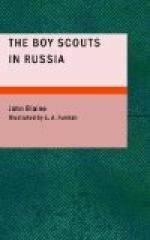“But how did you get one?” asked Fred. “And the German uniform?”
Ivan smiled significantly.
“I met a man of about my size,” he said. “I was walking. And I was tired. I took his cycle and his uniform away from him.”
There was something about his tone and the look in his eyes that made Fred refrain from asking any more questions. He admired Ivan greatly, but he was a little afraid of him, too. In him he could see what lay behind the general belief that Russia was still a barbarous, partially civilized state, the underlying truth of the old saying: “Scratch a Russian, and you will find a Tartar beneath.” He was glad that Ivan was on his side, and was bound to him, moreover, by his loyalty to the name of Suvaroff.
“Listen, now,” said Ivan. “Here it is very dangerous. Stay as long as you can, but never let yourselves be caught in the house by any Germans. Do not let the villagers see you. Take to the tunnel without hesitation if there is an attack upon the house, or a search. I think you will be safe as long as you are watchful, but you cannot be off your guard for even a moment. The Germans will think that you went back with the Cossacks but they will try to make sure.”
“We will be careful,” said Boris. “You are sure of what you have learned? There will be no more than two army corps in this region?”
“That is certain. I have scouted for twenty miles to the west and I have been along the railway lines. If there were more troops coming, I should have discovered it. I am sure of that.”
“And now you are going back toward our lines?”
“Yes. I may be of service to your father. And, in any case, I shall be of more use if I am with the German advanced position than if I stayed here, far in the rear. Good-bye!”
He departed through the tunnel. And then for Fred and Boris began a task almost harder than any that could have been set. They had to wait. There was nothing for them to do except sit in the little turret room. Below, Vladimir and the others kept a sort of guard, but there seemed little reason even for that.
From the turret, whence the wireless waves were sent pulsing out through the air, a fine view of the surrounding country for a good many miles was to be had. For the most part this was a level section, slightly undulating, but with very few high spots. From their vantage point the roads stretched out like ribbons or like lines on a map. Fred opened the wireless and amused himself by listening. At first he could hear only a confused jumble through the receivers that were clamped to his ear. Then he changed his wave length, experimenting until he got a clear series of dots and dashes.
“I think I’ll take this down,” he said to Boris. “It’ll be like Greek to us, of course, but it’s all German wireless talk, and it all means something. Perhaps if we’re lucky, we’ll stumble on to the key of the code they’re using, and that might be useful.”




